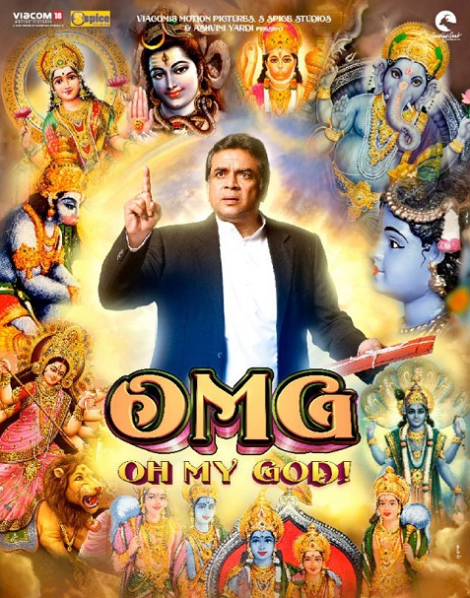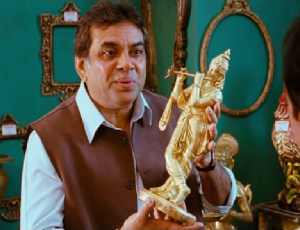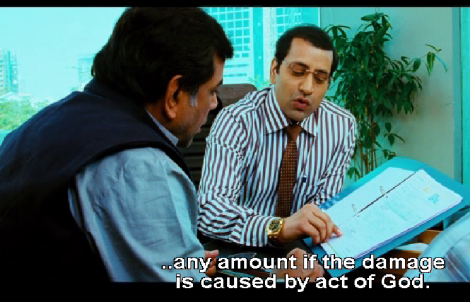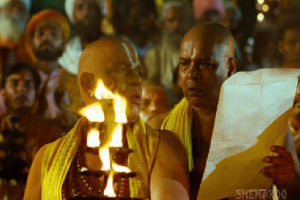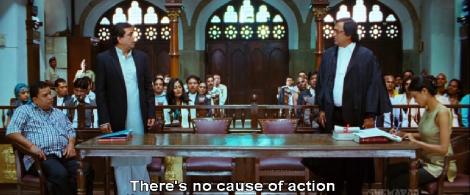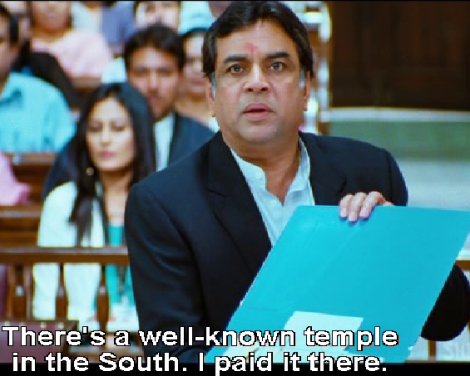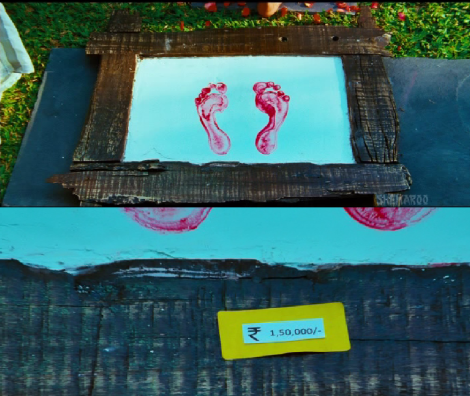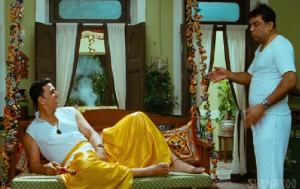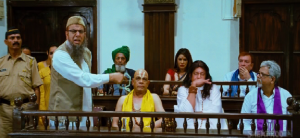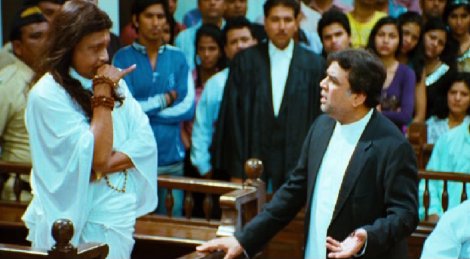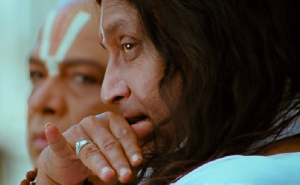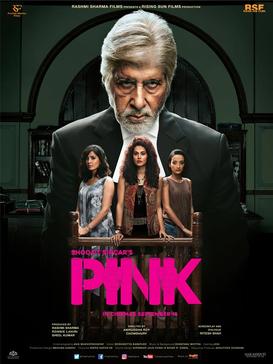aaLAWchak: OMG Oh My God!
Movie: OMG Oh My God!
Starring: Paresh Rawal, Mithun Chakraborty, Govind Namdeo, Mahesh Manjrekar and Akshay Kumar as Lord Krishna
Directed by: Umesh Shukla
Year of Release: 2012
OMG Oh My God! is an official remake of the 2001 Australian comedy ‘The Man Who Sued God’. Originally the makers had adopted the film ‘The Man Who Sued God’ for a Gujarati play titled ‘Kanji Virudh Kanji’.Thereafter, they used the storyline of the play for the film.
The movie starts on a light note with scenes of lead characters praying at the temple. The protagonist Kanji Lalji Mehta (Paresh Rawal) is shown to be an atheist who does not believe in the existence of God and only believes that God is a myth which has to be commercially exploited as people have a misplaced but very high belief in the divine.
Kanji Lalji Mehta owns a shop of hindu idols and antiques in Chor Bazaar, Mumbai. He is shown to be a shrewd and practical businessmen, who always looks for sensible things in life and believes that Karma is something that makes you prosperous and prayers are a sheer waste of time, energy and resources.
The story slowly establishes the people around Kanji Lalji Mehta and their belief in God. Everybody tells him that his attitude towards God, will eventually lead to his downfall.
One fine day, he is cursed by a Hindu Guru Siddheshwar Maharaj (Govind Namdeo), that God will punish him. Later, an earthquake of a very minor magnitude hits Mumbai. No damage is caused to any shop in the Chor Bazaar other than the shop of the protagonist.
Kanji Lalji Mehta is still upbeat and calm as any damage to the shop was insured by an insurance Company. The next day, when Kanji Lalji Mehta approaches the insurance Company for his claim, they cite the Force Majeure clause in his insurance policy and deny his claim as the earthquake was created by an ‘Act of God’ and hence not covered in the insurance policy.
Kanji Lalji Mehta loses his temper as he was on the verge of financial break down. He had secured loans on the basis of his house and he has no means of earning as he does not have money to pay for renovation of his shop. He decided to sell his shop but the same becomes unsaleable as the they are widespread rumors that the shop is cursed as earthquake has only damaged this shop which had hindu idols but an atheist owner.
Kanji still musters up some courage and decides to take on the insurance Company and the ‘GOD’ himself. Kanji approaches a bunch of lawyers, who refuse to take his case as and when they realize the man plans to sue God.
After a lot of disappointment, but with a tremendous will Kanji meets Advocate Hanif Qureshi (Om Puri).
Advocate Hanif Qureshi informs Kanji that he will not be able to fight the case in Court as he is crippled. However, he will be able to prepare legal notice and petition and Kanji can argue the case in Court. Kanji sends legal notices to all the Gurus practicing and preaching the Hindu religion and it’s ways.
Later, he files a suit for recovery of money against the said Gurus and religious sects as the insurance Company calls the reason for damage an ‘Act of God’. The Defendant’s counsel (Mahesh Manjrekar) or in other words counsel for religious heads seeks dismissal of the suit on the basis of Order VII Rule 11 (a) of the Code of Civil Procedure, 1908 on the ground that the case fails to disclose a cause of action.
Then begins a game of words, wits and confrontations. During the Court hearings and press interviews, Kanji tries to demonstrate the hypocrisy in the religious practices. He shows that just because somebody is praying to God or is a firm believer, does not mean that nothing adverse can happen to them. He bases his case on the fact that these religious heads take donations, fees and other offerings and assure no wrong will happen and that is why they should be liable for damage caused by ‘Act of God’.
The movie questions our mindset and our beliefs in the way we conduct our prayers to the divine. The movie never questions the God but questions how we have commercialized it’s existence and that there is a fear in our minds that if we don’t follow the supreme power, we will be doomed.
In his battle, Kanji faces a lot of challenges. He is followed by goons and his family leaves him. In these trouble times, Lord Krishna (Akshay Kumar) descends on earth to help Kanji out in his battles. He stays with him in his home as a person who has bought his house and will return when Kanji has the money to pay him.
The Court scenes in the movie are top notch. Kanji supports all his arguments by quick wit and clever dialogues. He challenges the system with brutal honesty.
The movie takes a larger scale in the latter part as the suit instituted by Kanji later becomes class action litigation as all the people(whose claims have been denied by the insurance Company on the ground of ‘Act of God’), of whatever religion, file similar claims against the relevant religious sects they prayed to.
Ultimately, the dispute boils down to the fact that whether an earthquake is an ‘Act of God’. If Kanji proves in affirmative, the religious sects would be liable and if he is unable to prove that then he might have to go empty handed.
Then comes the clincher of a scene where Kanji cross examines Leeladhar Swamy (Mithun Chakraborthy), a very renowned, popular and intelligent Hindu Guru in order to prove that the earthquake is an ‘Act of God’.
The movie is immensely watchable and does not steer away from the rhythm other than one song in the middle. It is funny, breezy, witty and superbly executed with attention to detail. It asks us to introspect and think on a lot of levels. The screenplay is swift and the dialogues are razor sharp.
The best performance has to be Mithun Chakraborty as Leeladhar Swamy. That character has such fine nuances and the veteran picks them perfectly.
The second in line and a major comic relief is Govind Namdeo as Siddheshwar Maharaj, it’s so much fun to watch him that I prayed, that more screen time be given to him. Paresh Rawal is as dependable as he always is. Akshay Kumar appears to be sleep walking his role but looks very simple and dashing at the same time. I will give extra credit for the designer who designed his outfits for the movie. Rests of the supporting characters are just fine and play their part well.
If you have seen Rajkumar Hirani’s PK but not this movie, I recommend you to watch it as there are a lot of similar issues raised and addressed. The movie is essentially a comical satire on our religious practices. It comes with a message that stays with you for long. I wouldn’t say it’s not to be missed but I pray to ‘GOD’ you watch it.
Legal Aspects:
Force Majuere/Act of God
Force majeure is a French term meaning “superior force”. It is a common contractual clause that essentially negates the liability of a party when an extraordinary event or circumstance takes place beyond the control of the parties. The examples of the same can be war, riots, strikes, etc. Other than that there could be natural phenomenon like earth quake, hurricane, floods, etc. which fall under common bracket of ‘Act of God’. This clause prevents the parties from fulfilling their obligations under the contract.
Order 7 Rule 11(a) – Rejection of plaint where it does not disclose a cause of action.
As per Section 26 of the Code of Civil Procedure, 1908, every suit has to be instituted by the presentation of a plaint or in such other manner as may be prescribed. As per Black’s law dictionary, a plaint is a private memorial tendered in open court to the judge, where the party injured sets forth his cause of action.
A cause of action is a bundle of facts which are required to be proved for obtaining relief (Mayar (H.K.) Ltd. v. Owners & Parties, Vessel M.V. Fortune Express; (2006) 3 SCC 100). In other words, a bundle of facts, which is necessary for the plaintiff to prove in order to succeed in the suit (Bloom Dekor Ltd. v. Subhash Himatlal Desai and Ors.; (1994) 6 SCC 322).
In a generic and wide sense “cause of action” means every fact, which it is necessary to establish to support a right to obtain a judgment(Sadanandan Bhadran v. Madhavan Sunil Kumar; 1998 CriLJ 4066).
“cause of action” consists of bundle of facts, which give cause to enforce the legal inquiry for redress in a court of law. In other words, it is a bundle of facts, which taken with the law applicable to them, gives the plaintiff a right to claim relief against the defendant. It must include some act done by the defendant since in the absence of such an act no cause of action would possibly accrue or would arise (South East Asia Shipping Co. Ltd. v. Nav Bharat Enterprises Pvt. Ltd. and Ors.; 1996 (3) SCR 405).
In case, a plaint fails to disclose a cause of action, the plaint is liable to be rejected under Order VII Rule 11(c) of the Code of Civil Procedure, 1908. In the present movie, the Defendant took the said defence as no cause of action against the religious heads were made out on account of the earthquake being caused to protagonist’s shop. However, the said defence was sort of rejected in the movie. As per us, it will be accepted in the real world.

